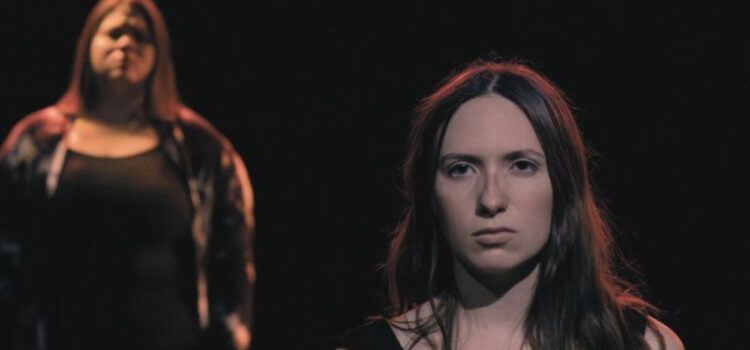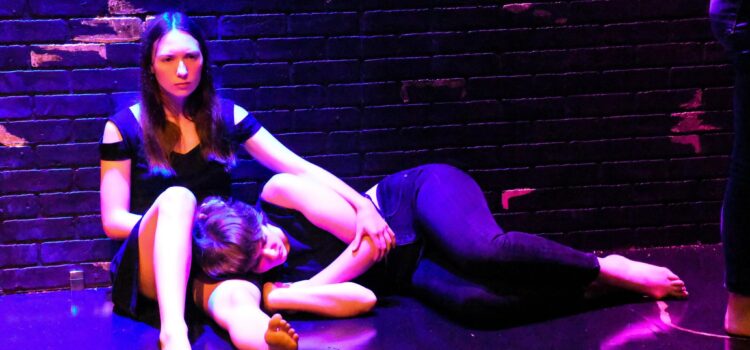By Lynn Venhaus
With an urgency as a downward spiral sets in, the musical “Cascade’s Fire” focuses on a group of alienated, angry youth whose story relates to the Greek tragedy “Antigone.”
This original musical, with book and lyrics by St. Louis playwright Taylor Gruenloh and music by Kyle Wernke, is premiering locally as part of Tesseract Theatre Company’s New Musical Summer Fest.
Meant to be a mirror of our world with its current struggles, “Cascade’s Fire” unfolds like a doom scroll. Think a police drama procedural episode meets “Hadestown,” with a nod to disaffected, decadent “Less Than Zero” youth culture.
An earnest cast of eight play a group of college students in various degrees of conflict, with two performers acting as the narrators – Brittney Roberson as the female chorus and Chris Melton as the male chorus.
Melton capably sets the scene, and considering that he was a last-minute replacement, it’s a notable achievement. He grounds the show like an older, wiser brother. He delivers a soulful “Pressure.”
Roberson’s dialogue borders on sanctimoniousness, is delivered like a screed, increasing in volume and an accusatory tone that comes across as in-your-face finger-wagging. Sometimes, she’s lecturing us, other times, she is telling off characters. This is a female chorus that is a bit too strident as a cautionary tale.
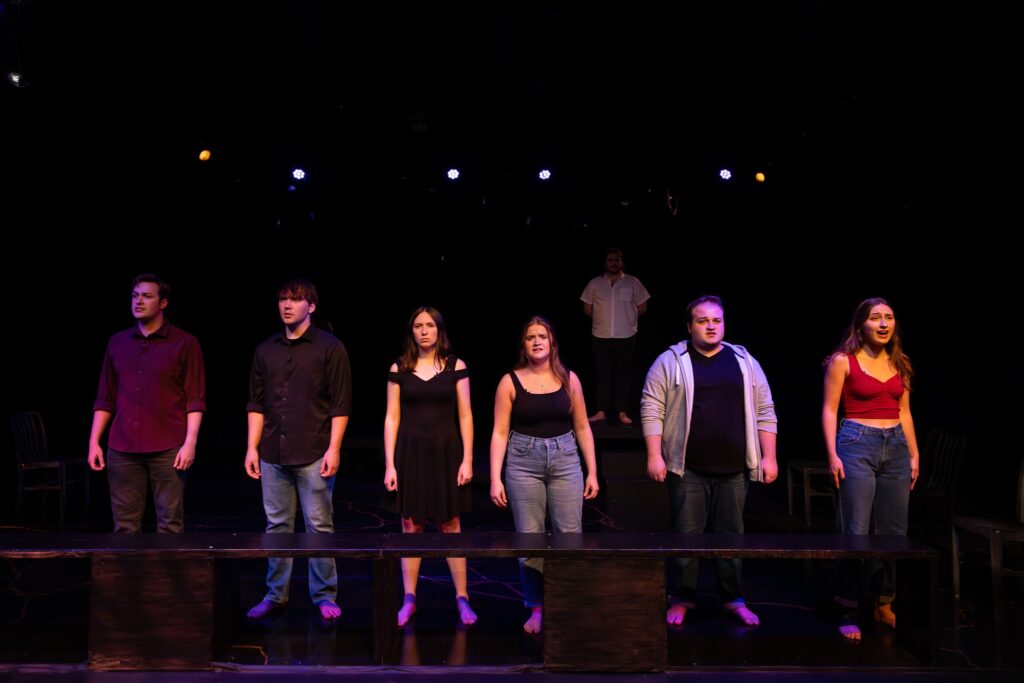
With the issues facing the characters – destructive romantic entanglements, emotional dishonesty, fear, rejection, intimidation, suicidal and murderous thoughts, greed, coercion, sex abuse, and human rights violations – the level of distress starts at 11 and escalates from there.
There is little time to connect with the characters because, like they are, we are plunged into the deep end, and the lack of effective communication prevents anyone from resolving serious problems. (Which of course is the tragedy, but the audience needs to build empathy).
I can understand the female distress presented here, because it touches on serious themes that are present in the world today, and need addressing.
So, the tone starts dark, then grows more dramatic with its torrent of heated confrontations and lots of yelling. There is much handwringing, self-righteous defiance, and selfish, petulant and cruel behaviors.
Tender moments are brief, but a few songs offer another facet of the characters, and those numbers have something deeply personal to say.
Because ultimately the message is that we are not alone, and unified, we can turn things around – and that is something to grab onto, bracketed by the opening and closing number “Live or Die.”
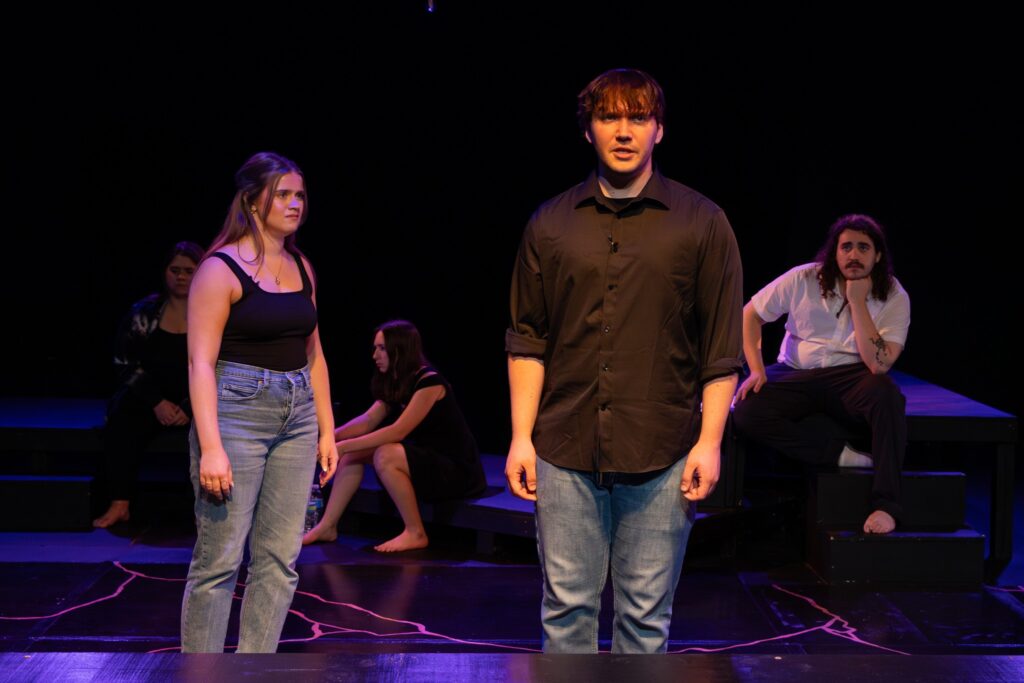
Kampbell Hemeyer plays lost soul Trinity, whose crippling despair should evoke more heartbreak. Demonstrating vulnerability, she is an important thread to the time and space continuity. Her solo number is a bittersweet “A Girl Like Me” and sings the sensitive “Just Someone” with Robbie.
Ella Penico shows some gumption as confused and scared Olivia, who must realize doing the right thing is always the best choice. Her solo number “With Nobody” is a heart-tugger.
In the title role, Josie Schnelten is the determined and bitter Cascade, who is seeking revenge for several grievances. Her passion needs to ignite the others into action.
Schnelten has a strong stage presence, and it’s up to her to unite the characters fighting for humanity, or we are a lost cause.
Cascade has returned to her old university to investigate the mysterious death of Trinity, who is her ex-girlfriend. She is unsure of who to trust and now is uncovering a conspiracy that could burn the whole town down.
The smug morally bankrupt male characters Robbie (Jordan Ray Duncan) and Luke (Luke Goeckner) are up to their eyeballs in no-good horrible oppression, running a criminal enterprise. Their friend Dylan, played by David Pesoni, seems caught in the middle.
A love triangle, Cascade joins Robbie and Trinity on a tender “Looking at You,” and then Luke on “Time” and Dylan on “Hurt.”
Robbie and Luke are tough roles, and the actors look too much alike, need to be better delineated so we can understand motivations, shifting sentiments, and how they affect mindsets.
The play is presented on a largely empty stage, and sound designer Sasha Bateman ensures everyone can be heard.
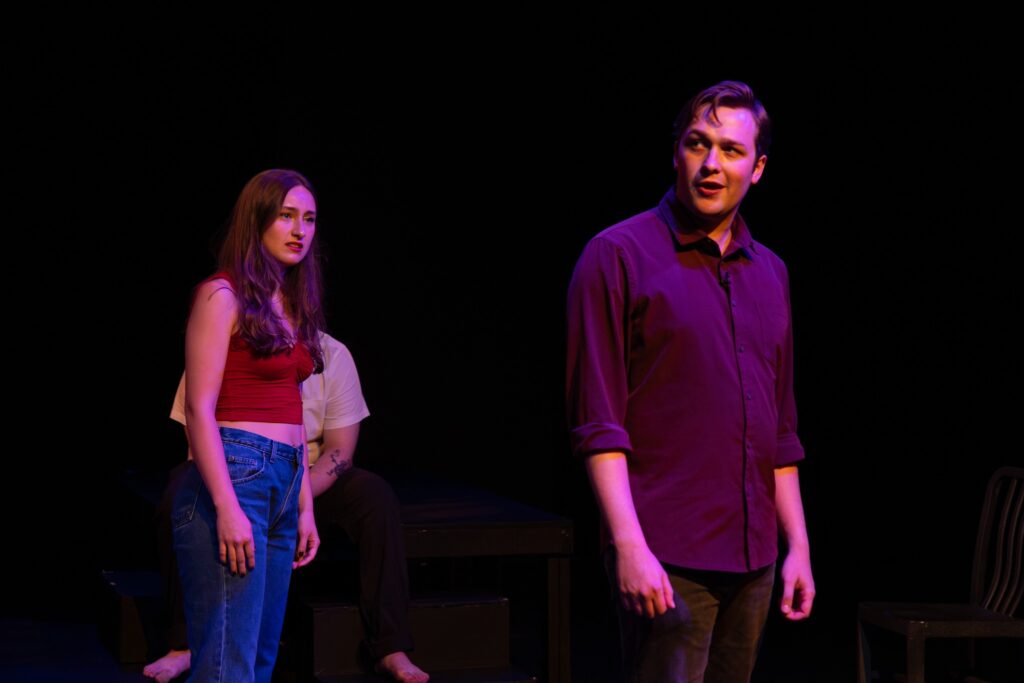
Gruenloh directed his own play, and he employed a stylized structure that involves the other actors being on stage while action focuses on mostly couples’ scenes. Actors walk to their marks, and that presents a loose format. Occasionally, they will stand, like a chorus, reciting lines reminiscent of Greek mythology.
Gruenloh was inspired by Sophocles’ 441 B.C. work because, as he explains in the program, culture uses it time and again during eras of democratic uncertainty. He wrote it at a time of national fervor, attaching the concepts of tragedy and folly to the subject of tyranny.
In the 2400 years since, there have been hundreds of translations and adaptations commenting on the extreme political divide. This is certainly perfect timing for people to revolt against oppression and intolerance, and using youth as a conduit is an intriguing direction.
Gruenloh, who founded Tesseract Theatre Company in 2010 with friend Brittanie Gunn, is an accomplished playwright whose works have been produced across the country. He was the artistic director until 2022, and now Gunn and Kevin Corpuz are in charge.
Gruenloh’s drama “Adverse Effects” was a 2020 finalist in the ScreenCraft Drama competition, and he won the 2017 St. Louis Fringe Festival for his play “Hot for T. Rex.” His “Purple Heart City” was published by NextStage Press in 2021. He also acts and directs.
Gruenloh, who is an assistant professor of theatre at Missouri Science and Technology in Rolla, works well with Gen Z, and inspires the cast who convey a passion for the material and project. Building on that sincerity could really be a turning point, for how he tackles social justice issues is admirable.
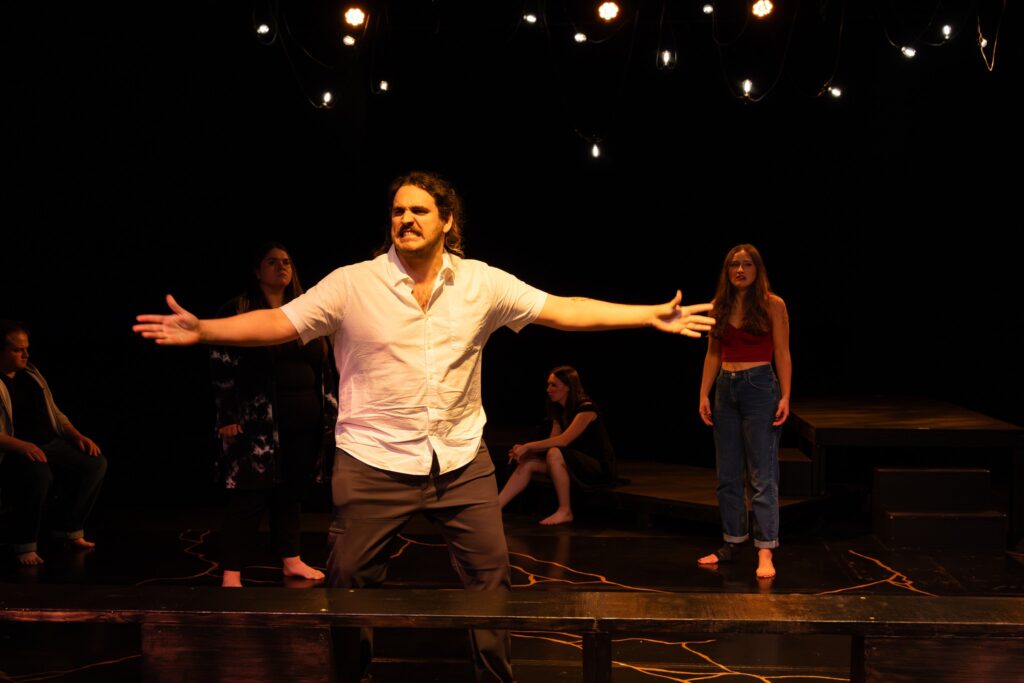
What this cast lacks in life experience and theatrical training techniques, they compensate for with their enthusiasm and commitment. They appear to be open to the challenge of shaping this original material, which should be workshopped further to develop deeper connections and broader multi-generational appeal.
From the start, there is little reason presented to engage with characters – no immediate gateway to connect. We should feel their anguish and pain.
On July 19, opening night, several vocals were problematic at times. More coaching by music director Randon Lane would have been helpful.
However, the finale reprising “Live or Die” is strong with pleasant harmonies. I’d like to become more familiar with Wernke’s and Gruenloh’s songs, for they had interesting melodies and lyrics from the heart.
The score is played solely on a piano, and the modern motifs reminiscent of rock operas and “Spring Awakening.” Wernke is also a professor at Missouri S&T.
The program does not include a list of the 11 musical numbers, but there are some standouts worth hearing again.
While ambitious and well-intentioned, “Cascade’s Fire” needs to be tighter, trimmer, and toned down with less shouting. It is not quite professionally polished for its close-up yet but has the potential to succeed with its drive and ideas.
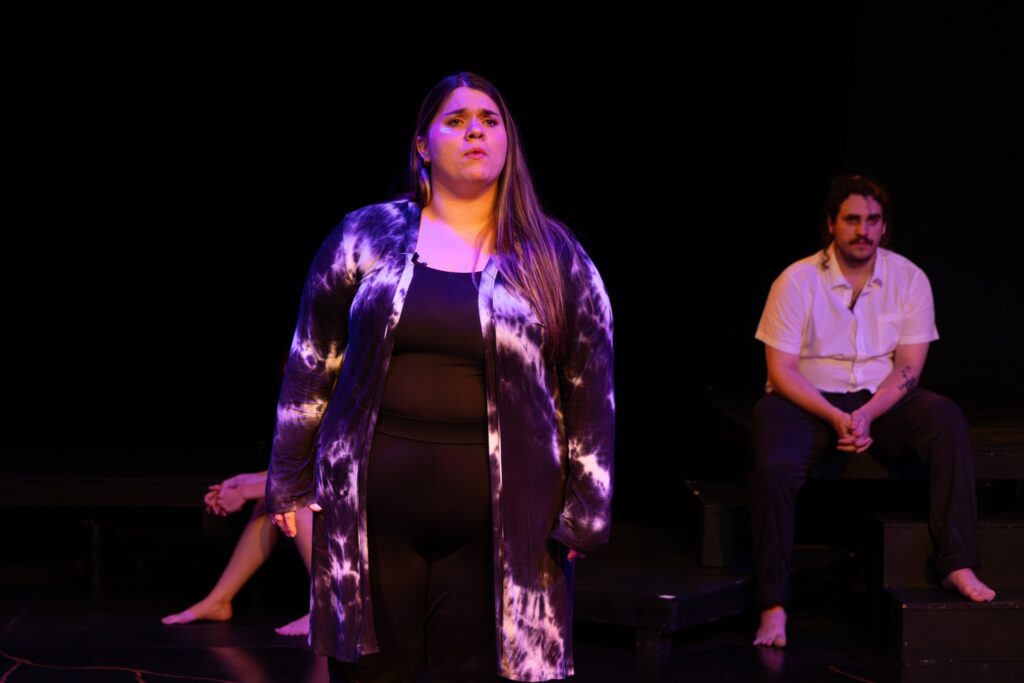
Tesseract Theatre Company presents “Cascade’s Fire” July 19, 20, 25, 26, 27 at 8 p.m. and July 28 at 4 p.m. at The Marcelle, 3310 Samuel Shepard Drive, in the Grand Center. It’s currently a one-hour and 50 minute one-act without intermission. For more information, visit https://www.tesseracttheatre.com/2024-summer-new-musical-festival
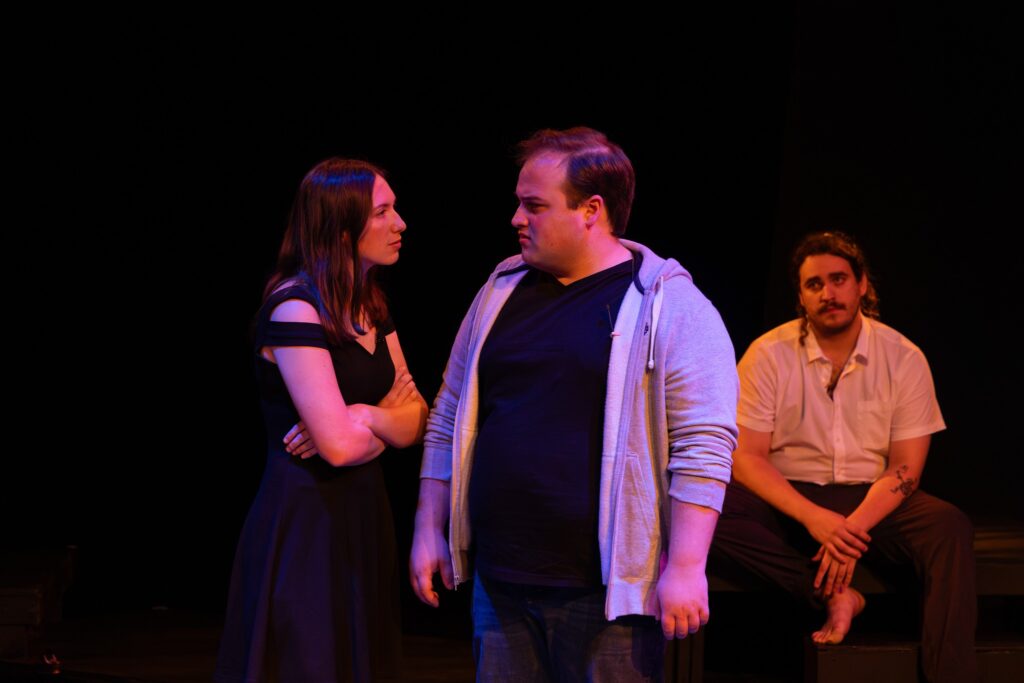
Josie Schnelten as Cascade, David Pesoni as Dylan, and Melton as Male Chorus Photo by Florence Flick.
Cover photo by Florence Flick.
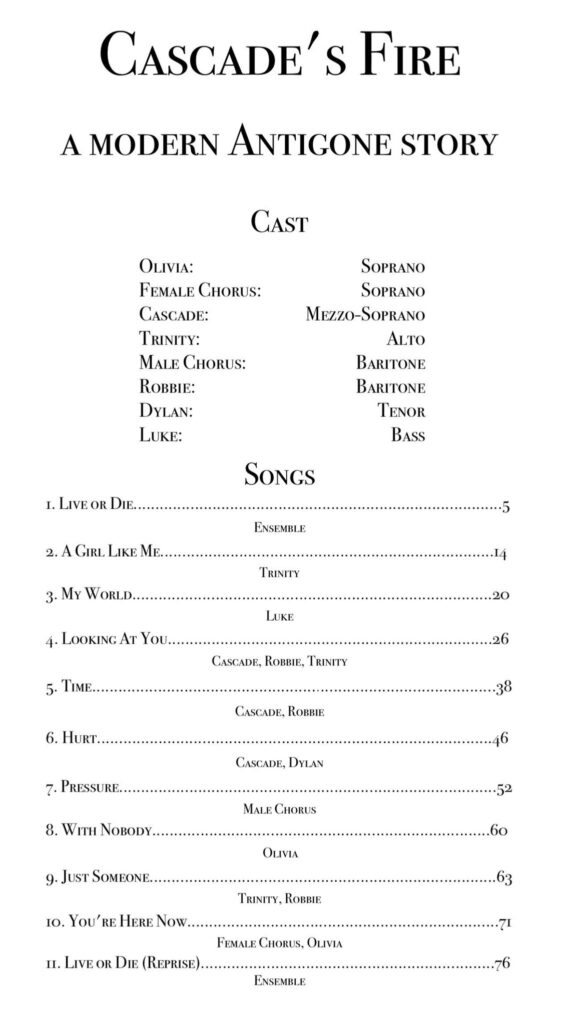

Lynn (Zipfel) Venhaus has had a continuous byline in St. Louis metro region publications since 1978. She writes features and news for Belleville News-Democrat and contributes to St. Louis magazine and other publications.
She is a Rotten Tomatoes-approved film critic, currently reviews films for Webster-Kirkwood Times and KTRS Radio, covers entertainment for PopLifeSTL.com and co-hosts podcast PopLifeSTL.com…Presents.
She is a member of Critics Choice Association, where she serves on the women’s and marketing committees; Alliance of Women Film Journalists; and on the board of the St. Louis Film Critics Association. She is a founding and board member of the St. Louis Theater Circle.
She is retired from teaching journalism/media as an adjunct college instructor.

